(完整版)大学英语口语课教案
大学英语口语课教案模板

课程名称:大学英语口语授课班级:XX班授课时间:每周XX课时授课地点:XX教室教学目标:1. 培养学生运用英语进行日常交流的能力。
2. 提高学生的英语口语发音、语调、语速等语言技巧。
3. 增强学生的英语思维能力和跨文化交际意识。
4. 培养学生自主学习、合作学习的能力。
教学内容及时间分配:一、热身活动(5分钟)1. 问候与自我介绍:教师简要介绍本节课主题,学生进行自我介绍。
2. 互动游戏:进行简单的英语口语游戏,如“我说你做”、“你画我猜”等,活跃课堂气氛。
二、词汇及句型讲解(10分钟)1. 介绍本节课重点词汇及短语。
2. 通过例句讲解词汇及短语的使用方法。
三、情景模拟(15分钟)1. 教师根据教学内容设定情景,学生分组进行角色扮演。
2. 学生在角色扮演过程中运用所学词汇及句型进行交流。
四、小组讨论(20分钟)1. 教师提出讨论话题,学生分组进行讨论。
2. 各小组选派代表进行总结发言,教师进行点评。
五、口语练习(20分钟)1. 学生进行口语练习,教师巡视指导。
2. 学生可以自由选择练习内容,如自我介绍、描述事物、讲述故事等。
六、课堂总结(5分钟)1. 教师对本节课所学内容进行总结,强调重点。
2. 学生分享本节课的收获和感悟。
教学重点与难点:1. 重点:运用所学词汇及句型进行口语交流。
2. 难点:克服口语表达中的语音、语调、语速等问题。
教学方法:1. 任务型教学法:通过完成任务的方式,让学生在实践中学习英语口语。
2. 合作学习法:通过小组讨论、角色扮演等形式,培养学生的团队协作能力。
3. 情景教学法:通过创设真实情景,提高学生的英语口语应用能力。
教学评价:1. 课堂表现:观察学生在课堂上的参与度、口语表达能力等。
2. 作业完成情况:检查学生课后口语练习的完成情况。
3. 口语测试:定期进行口语测试,评估学生的口语水平。
教学资源:1. 教材:《大学英语口语》2. 课件:制作与教学内容相关的PPT课件3. 网络资源:利用网络资源,如英语口语教学网站、视频等,丰富教学内容。
大学生英语口语教学教案模板

教案标题:大学生英语口语教学教案教学目标:1. 提高学生的英语口语表达能力和听力理解能力。
2. 培养学生运用英语进行日常交流的自信和习惯。
3. 增强学生的跨文化交际意识,提高跨文化沟通能力。
教学内容:1. 英语口语基础技能训练2. 日常交际用语和话题3. 英语国家文化背景知识介绍教学对象:大学生教学时间: 1课时教学准备:1. 教材和辅助教学材料2. 多媒体设备(如电脑、投影仪等)3. 语音设备(如录音机、音响等)4. 互动游戏道具或卡片教学过程:一、导入(5分钟)1. 利用多媒体播放一段与教学内容相关的英语视频或歌曲,激发学生的学习兴趣。
2. 引导学生用英语简单介绍自己,如姓名、专业、兴趣爱好等。
二、基础技能训练(20分钟)1. 教师讲解并示范英语口语基本技能,如语音、语调、节奏等。
2. 学生跟读练习,教师个别纠正发音和语调。
3. 学生分组进行对话练习,教师巡回指导。
三、日常交际用语和话题(15分钟)1. 教师选取与学生生活、学习、工作相关的日常交际话题,如购物、旅行、饮食等。
2. 学生分组进行角色扮演,模拟实际场景进行对话。
3. 教师点评并总结,引导学生注意常用表达和词汇。
四、文化背景知识介绍(10分钟)1. 教师简要介绍与教学内容相关的英语国家文化背景知识。
2. 学生分享自己对相关文化的了解和看法。
五、总结与反馈(5分钟)1. 教师对本节课的教学内容进行总结,强调重点和难点。
2. 学生反馈学习心得,提出改进建议。
教学评价:1. 学生课堂参与度2. 学生口语表达能力3. 学生对英语口语学习的兴趣和积极性课后作业:1. 复习本节课所学内容,完成课后练习。
2. 准备下一节课的角色扮演内容。
注意事项:1. 教师应根据学生的实际情况调整教学内容和进度。
2. 鼓励学生积极参与课堂活动,提高口语表达能力。
3. 注重培养学生的跨文化交际意识,提高学生的综合素质。
大学英语对话课教案模板(3篇)

第1篇---课程名称:大学英语口语课程目标:1. 培养学生运用英语进行日常交流的能力。
2. 提高学生的听力和口语表达技巧。
3. 增强学生的跨文化交际意识。
教学对象:大学英语学生教学时间: 1课时教学重点:1. 熟练掌握特定主题的常用词汇和句型。
2. 提高学生的听力理解能力和口语表达能力。
3. 培养学生在真实语境中进行交流的能力。
教学难点:1. 正确运用语法结构和词汇进行对话。
2. 在交流中克服紧张情绪,流畅表达。
教学准备:1. 教学课件(PPT或视频)2. 学生用书3. 白板或黑板4. 录音设备---一、教学导入(5分钟)1. 热身活动:- 播放一段轻松的音乐,让学生跟随节奏进行简单的英语口语练习,如自我介绍或问候。
2. 话题引入:- 通过提问或展示图片等方式,引入本节课的主题,激发学生的学习兴趣。
---二、新授环节(20分钟)1. 词汇讲解:- 介绍与主题相关的重点词汇,并通过例句帮助学生理解和记忆。
2. 句型讲解:- 讲解与主题相关的常用句型,强调其用法和语法结构。
3. 情景模拟:- 创设与主题相关的情景,让学生进行角色扮演,练习对话。
---三、巩固练习(15分钟)1. 小组讨论:- 将学生分成小组,就主题进行讨论,并轮流进行汇报。
2. 角色扮演:- 学生根据所学的词汇和句型,进行更加复杂的角色扮演练习。
3. 错误纠正:- 教师巡视课堂,及时纠正学生的错误,并给予指导。
---四、总结与反馈(5分钟)1. 课堂总结:- 教师对本节课的内容进行简要回顾,强调重点和难点。
2. 学生反馈:- 学生分享学习心得,提出疑问或建议。
3. 作业布置:- 布置与主题相关的口语练习作业,巩固所学内容。
---五、教学反思1. 教学效果:- 评估学生的学习效果,了解学生对本节课内容的掌握程度。
2. 教学改进:- 根据学生的反馈和教学效果,对教学方法和内容进行调整和改进。
---本教案模板可根据具体的教学内容和目标进行调整,旨在帮助学生提高英语口语能力,为今后的学习和生活打下坚实的基础。
大学英语口语优秀教案模板

---课程名称:大学英语口语授课班级:[班级名称]授课时间:[具体日期和时间]授课地点:[具体教室或地点]章节名称:[具体单元或主题]教学目标:1. 提升学生的英语口语表达能力。
2. 培养学生使用英语进行日常交流的能力。
3. 增强学生的跨文化交际意识。
教学内容:- 单元主题背景介绍- 词汇和短语学习- 语法知识点讲解- 口语对话练习- 角色扮演活动- 小组讨论与展示教学时间分配:- 词汇和短语学习(10分钟)- 语法知识点讲解(15分钟)- 口语对话练习(30分钟)- 角色扮演活动(20分钟)- 小组讨论与展示(15分钟)- 总结与反馈(10分钟)教学过程:一、导入(5分钟)- 利用多媒体展示与单元主题相关的图片或视频,激发学生的兴趣。
- 简要介绍本单元的主题,提出学习目标和计划。
二、词汇和短语学习(10分钟)- 列出本单元的关键词汇和短语,通过PPT或板书展示。
- 学生跟读并练习,教师纠正发音和语调。
三、语法知识点讲解(15分钟)- 讲解本单元的语法知识点,结合例句进行讲解。
- 学生跟读例句,并尝试造句。
四、口语对话练习(30分钟)- 分组练习,每组选取一个场景进行对话。
- 教师巡回指导,纠正发音和语法错误。
五、角色扮演活动(20分钟)- 分配角色,设置一个与单元主题相关的情景。
- 学生进行角色扮演,模拟真实场景下的对话。
六、小组讨论与展示(15分钟)- 将学生分成小组,就单元主题进行讨论。
- 每组选取一名代表进行展示,其他组进行评价。
七、总结与反馈(10分钟)- 教师总结本节课的重点内容,强调口语练习的重要性。
- 学生反馈学习心得,提出改进意见。
教学资源:- 教材及配套练习册- 多媒体课件- 英文原声视频或音频材料- 网络资源教学评价:- 学生参与度- 口语表达能力- 团队合作能力- 语法和词汇运用---备注:- 教师应根据学生的实际情况调整教学内容和进度。
- 鼓励学生积极参与课堂活动,提高口语交流能力。
大学英语口语教案模板

一、教学目标1. 提高学生的英语口语表达能力,增强学生的英语交际能力。
2. 培养学生的跨文化交际意识,提高学生的文化素养。
3. 增强学生的自信心,激发学生学习英语的兴趣。
二、教学内容1. 课程主题:根据实际需求,选择与学生生活、专业或兴趣相关的主题。
2. 词汇:围绕主题,选取常用词汇,确保学生能够熟练运用。
3. 句型:针对主题,设计实用句型,帮助学生进行口语表达。
4. 文化背景:介绍与主题相关的文化背景知识,拓展学生的视野。
三、教学步骤1. 导入(5分钟)- 通过简短的提问或话题讨论,引导学生进入课程主题。
- 激发学生的兴趣,营造轻松愉快的课堂氛围。
2. 词汇学习(10分钟)- 教师通过图片、实物或情景演示,展示与主题相关的词汇。
- 学生跟读并模仿,加深对词汇的记忆。
3. 句型练习(15分钟)- 教师讲解句型结构,示范实际应用。
- 学生分组练习,互相纠正发音和语法错误。
- 教师巡回指导,确保学生掌握句型。
4. 文化背景介绍(10分钟)- 教师介绍与主题相关的文化背景知识,帮助学生了解异国文化。
- 鼓励学生提问,分享自己对文化的理解和看法。
5. 口语练习(20分钟)- 教师设置情景,引导学生进行口语对话。
- 学生分组进行角色扮演,提高口语表达能力。
- 教师提供反馈,指出学生的优点和不足。
6. 总结与反思(5分钟)- 教师总结本节课的学习内容,强调重点。
- 学生分享自己的学习心得,提出改进意见。
四、教学评价1. 课堂表现:观察学生的参与度、互动能力和口语表达水平。
2. 作业完成情况:检查学生的课后练习,评估学生的口语水平。
3. 学生反馈:收集学生对课程的意见和建议,不断改进教学方法。
五、教学资源1. 教材:选用适合大学英语口语教学的教材,确保内容丰富、实用。
2. 课件:制作精美的课件,帮助学生更好地理解和记忆知识。
3. 网络资源:利用网络资源,拓展学生的知识面,提高学习兴趣。
六、教学注意事项1. 关注学生的个体差异,因材施教。
大学公开课英语口语课教案
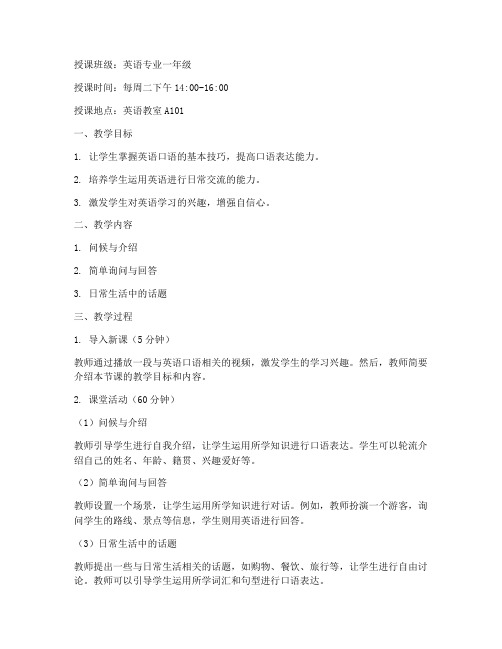
授课班级:英语专业一年级授课时间:每周二下午14:00-16:00授课地点:英语教室A101一、教学目标1. 让学生掌握英语口语的基本技巧,提高口语表达能力。
2. 培养学生运用英语进行日常交流的能力。
3. 激发学生对英语学习的兴趣,增强自信心。
二、教学内容1. 问候与介绍2. 简单询问与回答3. 日常生活中的话题三、教学过程1. 导入新课(5分钟)教师通过播放一段与英语口语相关的视频,激发学生的学习兴趣。
然后,教师简要介绍本节课的教学目标和内容。
2. 课堂活动(60分钟)(1)问候与介绍教师引导学生进行自我介绍,让学生运用所学知识进行口语表达。
学生可以轮流介绍自己的姓名、年龄、籍贯、兴趣爱好等。
(2)简单询问与回答教师设置一个场景,让学生运用所学知识进行对话。
例如,教师扮演一个游客,询问学生的路线、景点等信息,学生则用英语进行回答。
(3)日常生活中的话题教师提出一些与日常生活相关的话题,如购物、餐饮、旅行等,让学生进行自由讨论。
教师可以引导学生运用所学词汇和句型进行口语表达。
3. 课堂小结(5分钟)教师对本节课的内容进行总结,强调重点和难点,并布置课后作业。
四、教学重点与难点1. 教学重点:问候与介绍、简单询问与回答、日常生活中的话题。
2. 教学难点:正确运用英语口语表达,提高口语流畅度。
五、教学方法1. 讲授法:教师通过讲解,引导学生掌握英语口语的基本技巧。
2. 演示法:教师通过演示,让学生直观地了解英语口语表达的方法。
3. 活动法:通过课堂活动,让学生在实践中提高英语口语表达能力。
4. 互动法:鼓励学生积极参与课堂讨论,提高学生的口语互动能力。
六、教学评价1. 课堂表现:观察学生在课堂上的口语表达情况,包括发音、语调、语法等。
2. 课后作业:检查学生完成课后作业的情况,了解学生对本节课内容的掌握程度。
3. 定期测试:通过定期测试,了解学生的英语口语水平,为教学提供依据。
七、课后作业1. 复习本节课所学内容,熟练掌握问候与介绍、简单询问与回答、日常生活中的话题。
大学生英语口语教学教案模板
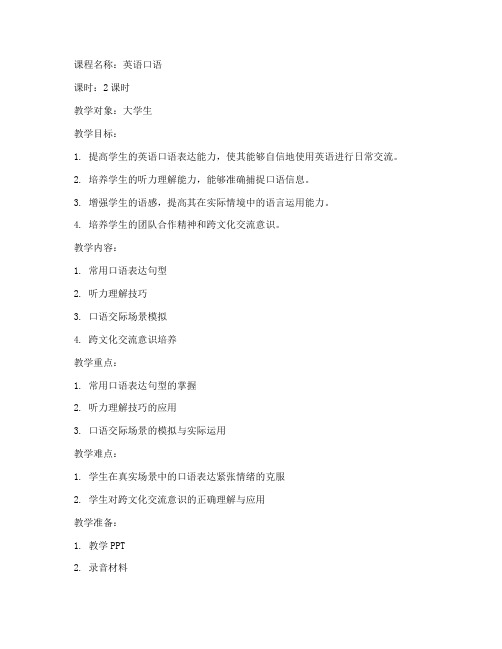
课程名称:英语口语课时:2课时教学对象:大学生教学目标:1. 提高学生的英语口语表达能力,使其能够自信地使用英语进行日常交流。
2. 培养学生的听力理解能力,能够准确捕捉口语信息。
3. 增强学生的语感,提高其在实际情境中的语言运用能力。
4. 培养学生的团队合作精神和跨文化交流意识。
教学内容:1. 常用口语表达句型2. 听力理解技巧3. 口语交际场景模拟4. 跨文化交流意识培养教学重点:1. 常用口语表达句型的掌握2. 听力理解技巧的应用3. 口语交际场景的模拟与实际运用教学难点:1. 学生在真实场景中的口语表达紧张情绪的克服2. 学生对跨文化交流意识的正确理解与应用教学准备:1. 教学PPT2. 录音材料3. 口语交际场景模拟道具4. 课堂活动卡片教学过程:第一课时一、导入(5分钟)1. 通过自我介绍,让学生放松心情,营造轻松的学习氛围。
2. 提出本节课的学习目标,让学生明确学习方向。
二、常用口语表达句型(20分钟)1. 教师讲解常用口语表达句型,如:问候、介绍、请求、感谢等。
2. 学生跟读并模仿,教师及时纠正发音和语调。
3. 学生分组练习,互相纠正口语表达错误。
三、听力理解技巧(15分钟)1. 教师播放听力材料,让学生初步了解听力内容。
2. 分析听力材料中的关键词和句型,讲解听力理解技巧。
3. 学生进行听力练习,教师点评并指导。
四、课堂小结(5分钟)1. 教师总结本节课所学内容,强调重点和难点。
2. 学生回顾所学,提出疑问。
第二课时一、复习(10分钟)1. 学生回顾上一节课所学内容,教师提问检查。
2. 学生分组进行口语表达练习,互相纠正错误。
二、口语交际场景模拟(20分钟)1. 教师设定口语交际场景,如:餐厅点餐、购物等。
2. 学生分组模拟场景,教师巡视指导。
3. 学生展示模拟场景,教师点评并指导。
三、跨文化交流意识培养(15分钟)1. 教师讲解跨文化交流的重要性,分析文化差异。
2. 学生分组讨论,分享自己在跨文化交流中的经验和体会。
大学英语口语教案全英文版
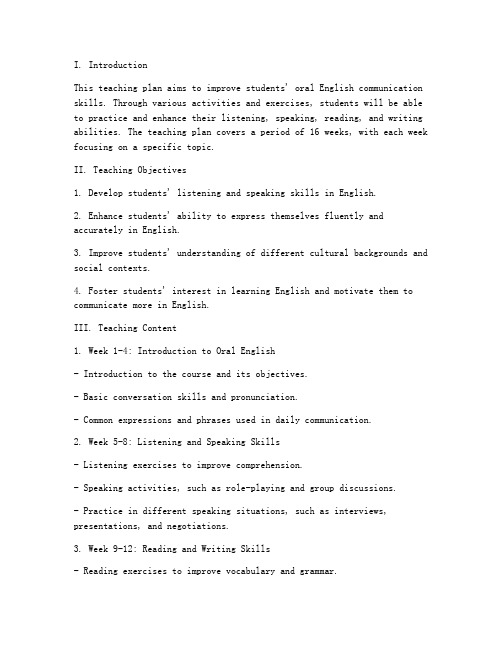
I. IntroductionThis teaching plan aims to improve students' oral English communication skills. Through various activities and exercises, students will be able to practice and enhance their listening, speaking, reading, and writing abilities. The teaching plan covers a period of 16 weeks, with each week focusing on a specific topic.II. Teaching Objectives1. Develop students' listening and speaking skills in English.2. Enhance students' ability to express themselves fluently and accurately in English.3. Improve students' understanding of different cultural backgrounds and social contexts.4. Foster students' interest in learning English and motivate them to communicate more in English.III. Teaching Content1. Week 1-4: Introduction to Oral English- Introduction to the course and its objectives.- Basic conversation skills and pronunciation.- Common expressions and phrases used in daily communication.2. Week 5-8: Listening and Speaking Skills- Listening exercises to improve comprehension.- Speaking activities, such as role-playing and group discussions.- Practice in different speaking situations, such as interviews, presentations, and negotiations.3. Week 9-12: Reading and Writing Skills- Reading exercises to improve vocabulary and grammar.- Writing tasks, including essays, reports, and emails.- Practice in summarizing and paraphrasing information.4. Week 13-16: Cultural Awareness and Communication- Introduce cultural differences and social norms.- Role-playing activities to simulate real-life communication scenarios.- Reflection and discussion on the importance of cultural awareness in communication.IV. Teaching Methods1. Interactive teaching: Encourage students to participate actively in class discussions and activities.2. Group work: Assign group tasks to promote teamwork and communication skills.3. Task-based learning: Design activities that require students to complete specific tasks in English.4. Project-based learning: Assign projects that allow students to apply their skills in real-life situations.5. Flipped classroom: Provide students with pre-class materials and assignments, allowing them to review and prepare before class.V. Assessment1. Class participation: Assess students' engagement and contribution in class activities.2. Group work: Evaluate the quality of group discussions and presentations.3. Individual assignments: Grade essays, reports, and other written tasks.4. Final presentation: Assess students' ability to communicate effectively in a real-life scenario.VI. Teaching ScheduleWeek 1-4: Introduction to Oral English- Week 1: Introduction to the course and basic conversation skills- Week 2: Pronunciation and common expressions- Week 3: Listening exercises and speaking activities- Week 4: Review and practiceWeek 5-8: Listening and Speaking Skills- Week 5: Listening exercises- Week 6: Speaking activities and role-playing- Week 7: Different speaking situations- Week 8: Review and practiceWeek 9-12: Reading and Writing Skills- Week 9: Reading exercises and vocabulary building- Week 10: Writing tasks and essay writing- Week 11: Summarizing and paraphrasing information- Week 12: Review and practiceWeek 13-16: Cultural Awareness and Communication- Week 13: Cultural differences and social norms- Week 14: Role-playing activities- Week 15: Importance of cultural awareness in communication- Week 16: Final presentation and course evaluationThis teaching plan aims to provide a comprehensive and engaging approach to learning English oral communication skills. By incorporating variousteaching methods and activities, students will be motivated to improve their English proficiency and apply it in real-life situations.。
大学生口语课教案
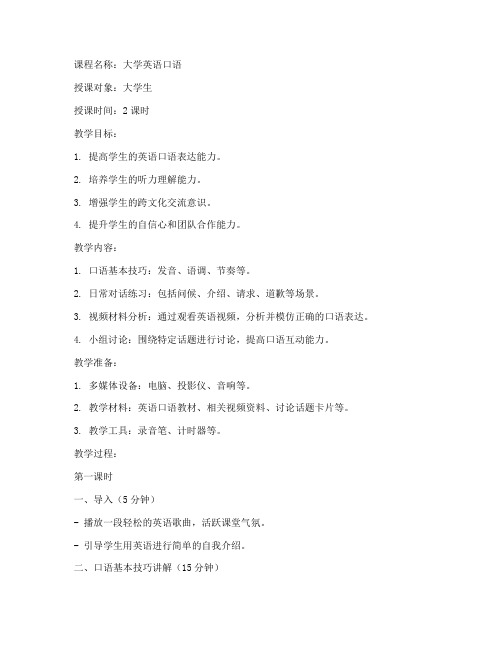
课程名称:大学英语口语授课对象:大学生授课时间:2课时教学目标:1. 提高学生的英语口语表达能力。
2. 培养学生的听力理解能力。
3. 增强学生的跨文化交流意识。
4. 提升学生的自信心和团队合作能力。
教学内容:1. 口语基本技巧:发音、语调、节奏等。
2. 日常对话练习:包括问候、介绍、请求、道歉等场景。
3. 视频材料分析:通过观看英语视频,分析并模仿正确的口语表达。
4. 小组讨论:围绕特定话题进行讨论,提高口语互动能力。
教学准备:1. 多媒体设备:电脑、投影仪、音响等。
2. 教学材料:英语口语教材、相关视频资料、讨论话题卡片等。
3. 教学工具:录音笔、计时器等。
教学过程:第一课时一、导入(5分钟)- 播放一段轻松的英语歌曲,活跃课堂气氛。
- 引导学生用英语进行简单的自我介绍。
二、口语基本技巧讲解(15分钟)- 讲解发音、语调、节奏等基本口语技巧。
- 通过示范和练习,让学生掌握正确的发音方法。
三、日常对话练习(20分钟)- 分组进行日常对话练习,如问候、介绍、请求、道歉等场景。
- 教师巡回指导,纠正发音和语法错误。
四、视频材料分析(10分钟)- 播放一段英语视频,让学生分析并模仿正确的口语表达。
- 引导学生关注视频中的语音语调、词汇运用等。
五、课堂小结(5分钟)- 回顾本节课所学内容,强调口语技巧的重要性。
- 布置课后作业,要求学生进行口语练习。
第二课时一、复习(5分钟)- 回顾上节课所学内容,检查学生的掌握情况。
二、小组讨论(20分钟)- 发放讨论话题卡片,让学生围绕特定话题进行讨论。
- 小组内分工合作,轮流发言,提高口语互动能力。
三、角色扮演(15分钟)- 设计一个简单的情景剧,让学生分组进行角色扮演。
- 角色扮演过程中,注意运用所学口语技巧。
四、总结与反馈(10分钟)- 教师对学生的表现进行点评,指出优点和不足。
- 学生互相评价,分享学习心得。
五、课堂小结(5分钟)- 回顾本节课所学内容,强调团队合作和口语表达能力的重要性。
英语口语课大学教案
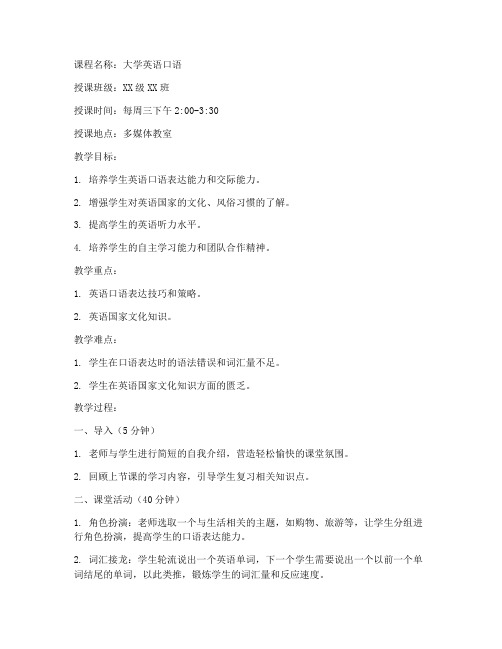
课程名称:大学英语口语授课班级:XX级XX班授课时间:每周三下午2:00-3:30授课地点:多媒体教室教学目标:1. 培养学生英语口语表达能力和交际能力。
2. 增强学生对英语国家的文化、风俗习惯的了解。
3. 提高学生的英语听力水平。
4. 培养学生的自主学习能力和团队合作精神。
教学重点:1. 英语口语表达技巧和策略。
2. 英语国家文化知识。
教学难点:1. 学生在口语表达时的语法错误和词汇量不足。
2. 学生在英语国家文化知识方面的匮乏。
教学过程:一、导入(5分钟)1. 老师与学生进行简短的自我介绍,营造轻松愉快的课堂氛围。
2. 回顾上节课的学习内容,引导学生复习相关知识点。
二、课堂活动(40分钟)1. 角色扮演:老师选取一个与生活相关的主题,如购物、旅游等,让学生分组进行角色扮演,提高学生的口语表达能力。
2. 词汇接龙:学生轮流说出一个英语单词,下一个学生需要说出一个以前一个单词结尾的单词,以此类推,锻炼学生的词汇量和反应速度。
3. 英语国家文化知识讲解:老师简要介绍英语国家的风俗习惯、节日等,引导学生关注英语国家文化。
三、课堂练习(10分钟)1. 学生分组进行小组讨论,围绕一个话题展开讨论,如“环保”、“科技发展”等,锻炼学生的口语表达能力和团队合作精神。
2. 老师挑选学生进行即兴演讲,考察学生的口语表达能力和现场应变能力。
四、课堂总结(5分钟)1. 老师对本节课的学习内容进行总结,强调重点和难点。
2. 学生分享本节课的收获和体会,互相学习、交流。
五、课后作业1. 学生自行查找与课堂话题相关的英语文章,进行阅读和翻译。
2. 学生准备下一节课的角色扮演和讨论话题。
教学评价:1. 学生在课堂活动中的参与度和表现。
2. 学生在课后作业中的完成情况。
3. 学生英语口语表达能力的提高。
备注:1. 教师应根据学生的实际情况调整教学内容和难度。
2. 课堂活动应注重学生的互动和参与,提高学生的学习兴趣。
3. 鼓励学生多开口说英语,培养良好的口语表达习惯。
大学英语口语公开课教案
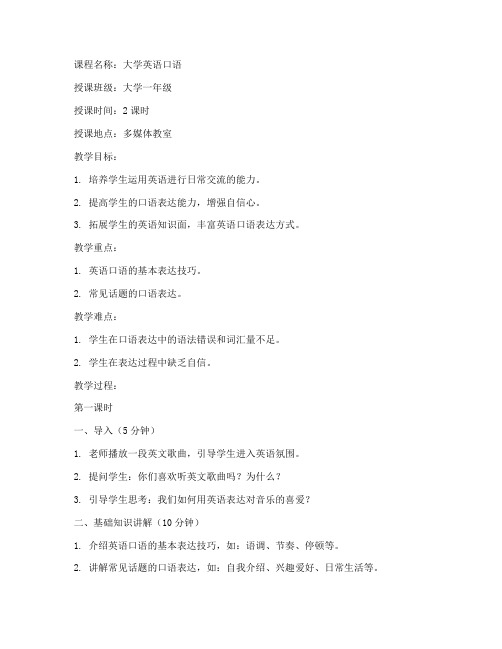
课程名称:大学英语口语授课班级:大学一年级授课时间:2课时授课地点:多媒体教室教学目标:1. 培养学生运用英语进行日常交流的能力。
2. 提高学生的口语表达能力,增强自信心。
3. 拓展学生的英语知识面,丰富英语口语表达方式。
教学重点:1. 英语口语的基本表达技巧。
2. 常见话题的口语表达。
教学难点:1. 学生在口语表达中的语法错误和词汇量不足。
2. 学生在表达过程中缺乏自信。
教学过程:第一课时一、导入(5分钟)1. 老师播放一段英文歌曲,引导学生进入英语氛围。
2. 提问学生:你们喜欢听英文歌曲吗?为什么?3. 引导学生思考:我们如何用英语表达对音乐的喜爱?二、基础知识讲解(10分钟)1. 介绍英语口语的基本表达技巧,如:语调、节奏、停顿等。
2. 讲解常见话题的口语表达,如:自我介绍、兴趣爱好、日常生活等。
三、小组讨论(15分钟)1. 将学生分成若干小组,每组讨论一个话题,如:如何向外国朋友介绍自己的家乡?2. 每组选派一名代表进行口语表达,其他组员进行评价和补充。
四、课堂练习(15分钟)1. 老师给出一个话题,如:描述一次难忘的旅行经历。
2. 学生轮流进行口语表达,老师给予指导和评价。
第二课时一、复习上节课内容(5分钟)1. 回顾上节课所学的基础知识和话题。
2. 学生进行自我介绍,巩固所学知识。
二、角色扮演(15分钟)1. 老师给出一个场景,如:在餐厅点餐。
2. 学生分组进行角色扮演,模拟实际生活场景。
三、小组讨论(10分钟)1. 学生分组讨论:如何提高英语口语水平?2. 每组选派一名代表进行总结发言。
四、课堂总结(5分钟)1. 老师对本节课进行总结,强调口语表达的重要性。
2. 鼓励学生在课后多进行英语口语练习。
教学评价:1. 观察学生在课堂上的口语表达情况,了解学生的进步。
2. 课后收集学生作业,了解学生的口语表达能力。
3. 定期进行口语测试,评估学生的口语水平。
教学反思:1. 关注学生在口语表达中的困难和需求,及时调整教学策略。
大学口语课程教案
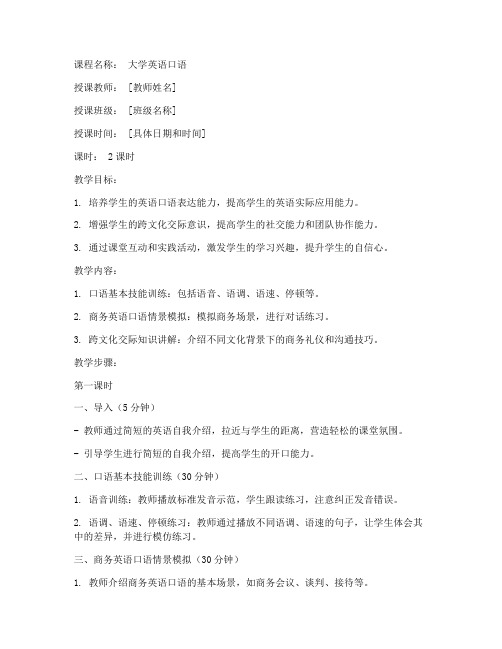
课程名称:大学英语口语授课教师: [教师姓名]授课班级: [班级名称]授课时间: [具体日期和时间]课时: 2课时教学目标:1. 培养学生的英语口语表达能力,提高学生的英语实际应用能力。
2. 增强学生的跨文化交际意识,提高学生的社交能力和团队协作能力。
3. 通过课堂互动和实践活动,激发学生的学习兴趣,提升学生的自信心。
教学内容:1. 口语基本技能训练:包括语音、语调、语速、停顿等。
2. 商务英语口语情景模拟:模拟商务场景,进行对话练习。
3. 跨文化交际知识讲解:介绍不同文化背景下的商务礼仪和沟通技巧。
教学步骤:第一课时一、导入(5分钟)- 教师通过简短的英语自我介绍,拉近与学生的距离,营造轻松的课堂氛围。
- 引导学生进行简短的自我介绍,提高学生的开口能力。
二、口语基本技能训练(30分钟)1. 语音训练:教师播放标准发音示范,学生跟读练习,注意纠正发音错误。
2. 语调、语速、停顿练习:教师通过播放不同语调、语速的句子,让学生体会其中的差异,并进行模仿练习。
三、商务英语口语情景模拟(30分钟)1. 教师介绍商务英语口语的基本场景,如商务会议、谈判、接待等。
2. 学生分组进行角色扮演,模拟商务场景对话。
四、课堂小结(5分钟)- 教师总结本节课所学内容,强调口语训练的重要性。
第二课时一、复习上节课内容(10分钟)- 教师通过提问或小测验,检查学生对上节课内容的掌握情况。
二、跨文化交际知识讲解(30分钟)1. 教师介绍不同文化背景下的商务礼仪和沟通技巧。
2. 学生分享自己了解的跨文化交际知识,互相学习。
三、商务英语口语情景模拟(40分钟)1. 教师设置更复杂的商务场景,如跨文化商务谈判。
2. 学生分组进行角色扮演,提高实际应用能力。
四、课堂小结(10分钟)- 教师总结本节课所学内容,鼓励学生在日常生活中多练习英语口语。
教学评价:1. 课堂参与度:观察学生在课堂上的表现,如发言次数、参与程度等。
2. 口语表达能力:通过角色扮演、小组讨论等方式,评价学生的口语表达能力。
大学生英语口语教学教案范文
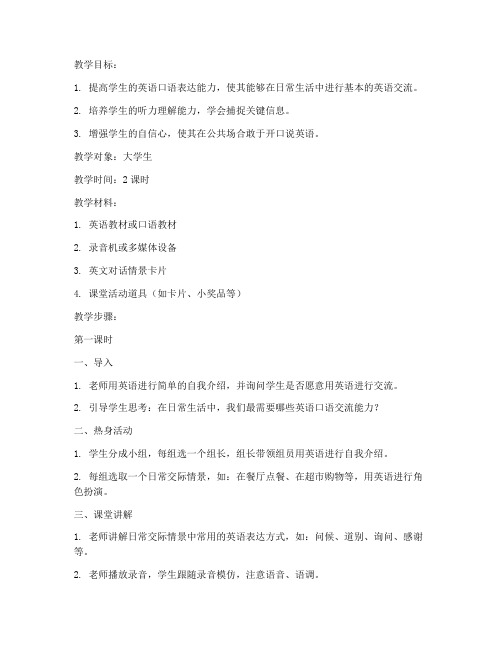
教学目标:1. 提高学生的英语口语表达能力,使其能够在日常生活中进行基本的英语交流。
2. 培养学生的听力理解能力,学会捕捉关键信息。
3. 增强学生的自信心,使其在公共场合敢于开口说英语。
教学对象:大学生教学时间:2课时教学材料:1. 英语教材或口语教材2. 录音机或多媒体设备3. 英文对话情景卡片4. 课堂活动道具(如卡片、小奖品等)教学步骤:第一课时一、导入1. 老师用英语进行简单的自我介绍,并询问学生是否愿意用英语进行交流。
2. 引导学生思考:在日常生活中,我们最需要哪些英语口语交流能力?二、热身活动1. 学生分成小组,每组选一个组长,组长带领组员用英语进行自我介绍。
2. 每组选取一个日常交际情景,如:在餐厅点餐、在超市购物等,用英语进行角色扮演。
三、课堂讲解1. 老师讲解日常交际情景中常用的英语表达方式,如:问候、道别、询问、感谢等。
2. 老师播放录音,学生跟随录音模仿,注意语音、语调。
四、练习环节1. 学生分成两人一组,进行角色扮演,模拟日常交际情景。
2. 老师巡回指导,纠正发音和语法错误。
五、课堂小结1. 老师总结本节课的重点内容,强调日常交际情景中的英语表达方式。
2. 学生分享学习心得,提出自己在学习过程中遇到的问题。
第二课时一、复习导入1. 老师提问:上节课我们学习了哪些日常交际情景?2. 学生回答,老师进行补充和纠正。
二、课堂活动1. 学生分成四人一组,每组选取一个日常交际情景,如:在机场接机、在酒店入住等,用英语进行角色扮演。
2. 每组派一名代表向全班展示,其他组员进行评价。
三、拓展训练1. 老师提供一段英文对话,要求学生根据对话内容进行角色扮演。
2. 学生自由组合,进行角色扮演,老师进行评价和指导。
四、课堂小结1. 老师总结本节课的重点内容,强调角色扮演在提高口语表达能力中的作用。
2. 学生分享学习心得,提出自己在学习过程中遇到的问题。
教学评价:1. 观察学生在课堂上的表现,如:参与度、发音、语调等。
大学英语初级口语课教案
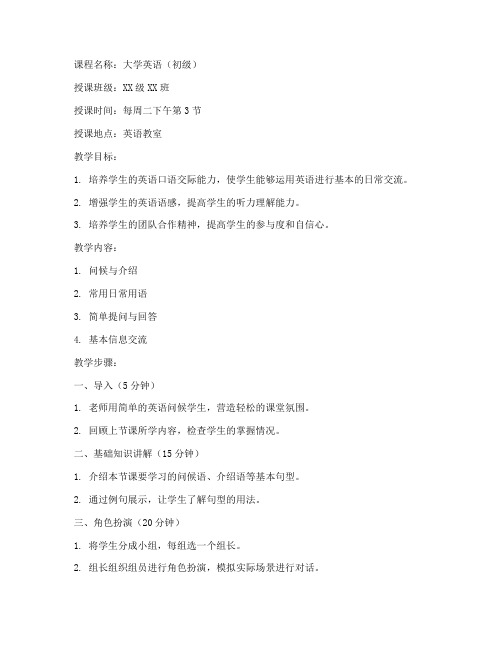
课程名称:大学英语(初级)授课班级:XX级XX班授课时间:每周二下午第3节授课地点:英语教室教学目标:1. 培养学生的英语口语交际能力,使学生能够运用英语进行基本的日常交流。
2. 增强学生的英语语感,提高学生的听力理解能力。
3. 培养学生的团队合作精神,提高学生的参与度和自信心。
教学内容:1. 问候与介绍2. 常用日常用语3. 简单提问与回答4. 基本信息交流教学步骤:一、导入(5分钟)1. 老师用简单的英语问候学生,营造轻松的课堂氛围。
2. 回顾上节课所学内容,检查学生的掌握情况。
二、基础知识讲解(15分钟)1. 介绍本节课要学习的问候语、介绍语等基本句型。
2. 通过例句展示,让学生了解句型的用法。
三、角色扮演(20分钟)1. 将学生分成小组,每组选一个组长。
2. 组长组织组员进行角色扮演,模拟实际场景进行对话。
3. 老师巡回指导,纠正学生的发音和语法错误。
四、小组讨论(15分钟)1. 提出一个与生活相关的主题,如“我的家乡”或“我的兴趣爱好”。
2. 学生以小组为单位,用英语进行讨论,并派代表进行分享。
五、课堂小结(5分钟)1. 老师对本节课所学内容进行总结,强调重点和难点。
2. 鼓励学生在课后多加练习,提高英语口语水平。
教学评价:1. 课堂参与度:观察学生在课堂上的发言次数和积极性。
2. 口语表达:评估学生的发音、语法和词汇运用能力。
3. 小组讨论:评价学生在小组讨论中的表现,如团队合作、表达能力等。
教学资源:1. 多媒体课件,包括图片、视频等辅助教学资源。
2. 英文原版教材,如《新编大学英语》等。
3. 网络资源,如英语学习网站、APP等。
课后作业:1. 复习本节课所学内容,巩固所学句型和词汇。
2. 每天进行英语口语练习,如模仿教材中的对话或自编对话。
3. 观看英语电影或听英语歌曲,提高听力水平。
教学反思:1. 根据学生的学习情况,调整教学方法和进度。
2. 注重培养学生的口语交际能力,提高学生的自信心。
大学英语口语教案word
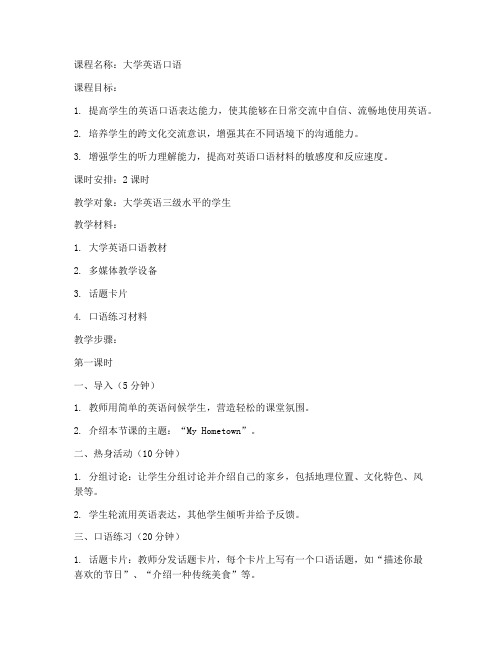
课程名称:大学英语口语课程目标:1. 提高学生的英语口语表达能力,使其能够在日常交流中自信、流畅地使用英语。
2. 培养学生的跨文化交流意识,增强其在不同语境下的沟通能力。
3. 增强学生的听力理解能力,提高对英语口语材料的敏感度和反应速度。
课时安排:2课时教学对象:大学英语三级水平的学生教学材料:1. 大学英语口语教材2. 多媒体教学设备3. 话题卡片4. 口语练习材料教学步骤:第一课时一、导入(5分钟)1. 教师用简单的英语问候学生,营造轻松的课堂氛围。
2. 介绍本节课的主题:“My Hometown”。
二、热身活动(10分钟)1. 分组讨论:让学生分组讨论并介绍自己的家乡,包括地理位置、文化特色、风景等。
2. 学生轮流用英语表达,其他学生倾听并给予反馈。
三、口语练习(20分钟)1. 话题卡片:教师分发话题卡片,每个卡片上写有一个口语话题,如“描述你最喜欢的节日”、“介绍一种传统美食”等。
2. 学生根据卡片上的话题进行即兴演讲,时间为2分钟。
3. 同伴互评:学生之间互相评价,提出改进建议。
四、情景模拟(15分钟)1. 教师设计一个简单的情景,如“在机场接机”。
2. 学生分组进行角色扮演,模拟真实场景下的对话。
3. 教师观察并给予指导。
五、总结与反思(5分钟)1. 教师总结本节课的学习内容,强调口语表达的技巧。
2. 学生分享自己的学习心得和体会。
第二课时一、复习(5分钟)1. 教师提问上一节课的学习内容,检查学生的掌握情况。
2. 学生回答问题,巩固所学知识。
二、拓展活动(15分钟)1. 视频观看:播放一段关于不同国家的文化介绍的英语视频。
2. 学生观看后,分组讨论并分享自己的看法。
三、口语游戏(20分钟)1. 游戏名称:“20 Questions”。
2. 学生分成两人一组,一人扮演侦探,一人扮演嫌疑人。
3. 侦探通过提问,尝试在20个问题内猜出嫌疑人的身份。
四、小组展示(15分钟)1. 学生分组,每组准备一个关于某个话题的英语演讲。
大学口语英语教案模板及范文
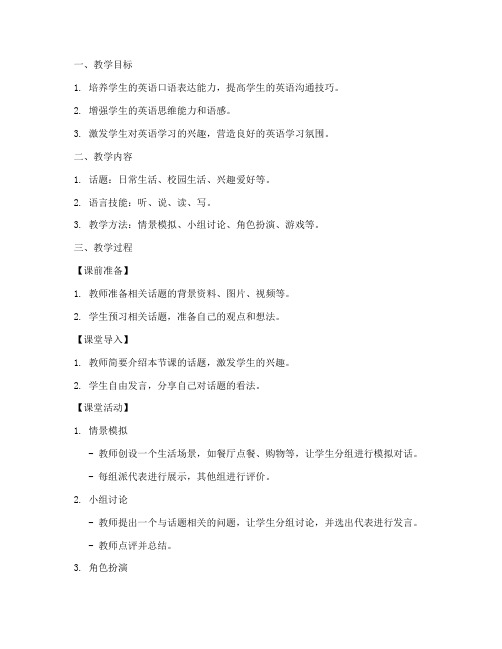
一、教学目标1. 培养学生的英语口语表达能力,提高学生的英语沟通技巧。
2. 增强学生的英语思维能力和语感。
3. 激发学生对英语学习的兴趣,营造良好的英语学习氛围。
二、教学内容1. 话题:日常生活、校园生活、兴趣爱好等。
2. 语言技能:听、说、读、写。
3. 教学方法:情景模拟、小组讨论、角色扮演、游戏等。
三、教学过程【课前准备】1. 教师准备相关话题的背景资料、图片、视频等。
2. 学生预习相关话题,准备自己的观点和想法。
【课堂导入】1. 教师简要介绍本节课的话题,激发学生的兴趣。
2. 学生自由发言,分享自己对话题的看法。
【课堂活动】1. 情景模拟- 教师创设一个生活场景,如餐厅点餐、购物等,让学生分组进行模拟对话。
- 每组派代表进行展示,其他组进行评价。
2. 小组讨论- 教师提出一个与话题相关的问题,让学生分组讨论,并选出代表进行发言。
- 教师点评并总结。
3. 角色扮演- 教师将学生分成若干小组,每组分配不同的角色,如学生、老师、警察等。
- 学生根据角色进行对话,模拟实际场景。
4. 游戏环节- 教师组织一个与话题相关的游戏,如“你画我猜”、“英语接龙”等。
- 游戏过程中,学生需用英语进行表达。
【课堂总结】1. 教师对本节课的学习内容进行总结,强调重点和难点。
2. 学生分享自己的学习心得,提出疑问。
四、课后作业1. 每位学生撰写一篇关于话题的短文,要求用英语表达。
2. 学生与家长用英语进行对话,分享自己的学习成果。
五、教学反思1. 教师反思本节课的教学效果,分析学生的掌握情况。
2. 教师根据学生的反馈,调整教学方法,提高教学质量。
教案范文:一、教学目标1. 培养学生的英语口语表达能力,提高学生的英语沟通技巧。
2. 增强学生的英语思维能力和语感。
3. 激发学生对英语学习的兴趣,营造良好的英语学习氛围。
二、教学内容1. 话题:校园生活2. 语言技能:听、说、读、写3. 教学方法:情景模拟、小组讨论、角色扮演、游戏等三、教学过程【课前准备】1. 教师准备校园生活的背景资料、图片、视频等。
大学英语口语课教案设计
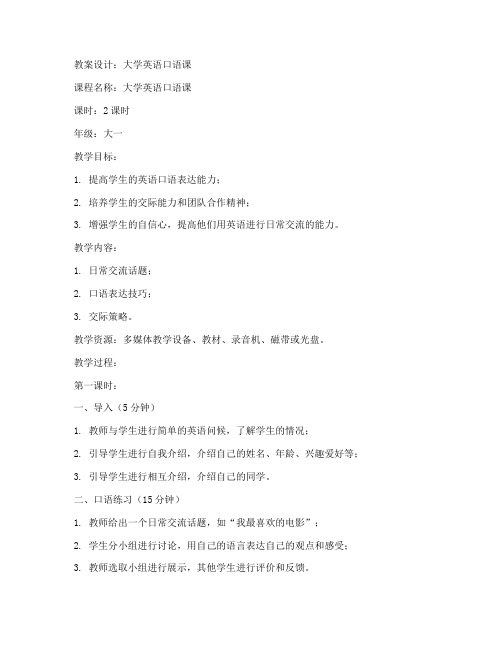
教案设计:大学英语口语课课程名称:大学英语口语课课时:2课时年级:大一教学目标:1. 提高学生的英语口语表达能力;2. 培养学生的交际能力和团队合作精神;3. 增强学生的自信心,提高他们用英语进行日常交流的能力。
教学内容:1. 日常交流话题;2. 口语表达技巧;3. 交际策略。
教学资源:多媒体教学设备、教材、录音机、磁带或光盘。
教学过程:第一课时:一、导入(5分钟)1. 教师与学生进行简单的英语问候,了解学生的情况;2. 引导学生进行自我介绍,介绍自己的姓名、年龄、兴趣爱好等;3. 引导学生进行相互介绍,介绍自己的同学。
二、口语练习(15分钟)1. 教师给出一个日常交流话题,如“我最喜欢的电影”;2. 学生分小组进行讨论,用自己的语言表达自己的观点和感受;3. 教师选取小组进行展示,其他学生进行评价和反馈。
三、口语表达技巧讲解(10分钟)1. 教师讲解口语表达技巧,如如何表达自己的观点、如何进行转折等;2. 学生进行口语练习,运用所学的表达技巧;3. 教师进行评价和指导。
四、课堂小结(5分钟)1. 教师总结本节课的主要内容和口语表达技巧;2. 学生进行自我评价,反思自己的口语表达情况;3. 教师布置课后作业,要求学生进行口语练习。
第二课时:一、复习导入(5分钟)1. 教师与学生进行简单的英语问候,了解学生的情况;2. 复习上节课的口语表达技巧;3. 引导学生进行自我介绍,介绍自己的姓名、年龄、兴趣爱好等。
二、口语练习(15分钟)1. 教师给出一个日常交流话题,如“我最喜欢的食物”;2. 学生分小组进行讨论,用自己的语言表达自己的观点和感受;3. 教师选取小组进行展示,其他学生进行评价和反馈。
三、交际策略讲解(10分钟)1. 教师讲解交际策略,如如何提问、如何进行回应等;2. 学生进行口语练习,运用所学的交际策略;3. 教师进行评价和指导。
四、课堂小结(5分钟)1. 教师总结本节课的主要内容和交际策略;2. 学生进行自我评价,反思自己的口语表达和交际情况;3. 教师布置课后作业,要求学生进行口语练习。
大学教师英语口语教案
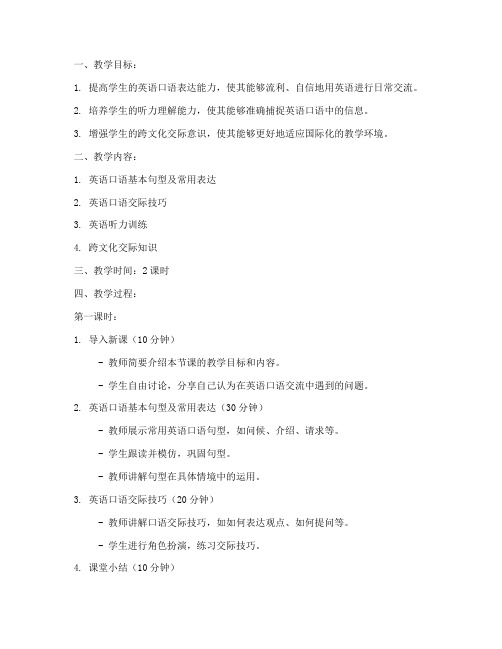
一、教学目标:1. 提高学生的英语口语表达能力,使其能够流利、自信地用英语进行日常交流。
2. 培养学生的听力理解能力,使其能够准确捕捉英语口语中的信息。
3. 增强学生的跨文化交际意识,使其能够更好地适应国际化的教学环境。
二、教学内容:1. 英语口语基本句型及常用表达2. 英语口语交际技巧3. 英语听力训练4. 跨文化交际知识三、教学时间:2课时四、教学过程:第一课时:1. 导入新课(10分钟)- 教师简要介绍本节课的教学目标和内容。
- 学生自由讨论,分享自己认为在英语口语交流中遇到的问题。
2. 英语口语基本句型及常用表达(30分钟)- 教师展示常用英语口语句型,如问候、介绍、请求等。
- 学生跟读并模仿,巩固句型。
- 教师讲解句型在具体情境中的运用。
3. 英语口语交际技巧(20分钟)- 教师讲解口语交际技巧,如如何表达观点、如何提问等。
- 学生进行角色扮演,练习交际技巧。
4. 课堂小结(10分钟)- 教师总结本节课所学内容,强调重点。
- 学生分享自己在课堂上的收获。
第二课时:1. 英语听力训练(30分钟)- 教师播放英语口语材料,如对话、短文等。
- 学生认真聆听,并回答相关问题。
- 教师讲解听力材料中的重点词汇和句型。
2. 跨文化交际知识(20分钟)- 教师讲解跨文化交际的基本原则,如尊重对方、理解差异等。
- 学生进行案例分析,探讨如何在跨文化交际中避免误解。
3. 课堂活动(20分钟)- 学生分组进行口语交流,模拟真实场景。
- 教师巡回指导,帮助学生提高口语表达能力。
4. 课堂小结(10分钟)- 教师总结本节课所学内容,强调重点。
- 学生分享自己在课堂上的收获。
五、教学评价:1. 课堂表现:观察学生在课堂上的参与程度、口语表达流畅度等。
2. 作业完成情况:检查学生课后完成的相关练习,如口语练习、听力练习等。
3. 跨文化交际能力:观察学生在实际交流中的跨文化意识,如尊重对方、理解差异等。
六、教学反思:1. 根据学生的反馈,调整教学策略,提高教学效果。
大学英语口语课优秀教案

一、课程名称:大学英语口语二、授课班级:XX级XX班三、授课教师:[教师姓名]四、授课时间:2023年[具体日期]五、授课地点:[具体教室名称]六、教学目标:1. 知识目标:- 学生能够掌握基本的口语交际技巧,包括听力理解、口语表达、词汇和语法运用。
- 学生能够理解并运用常用口语表达和句型,提高日常英语交流能力。
2. 技能目标:- 学生能够通过小组讨论、角色扮演等方式,积极参与课堂活动,提高口语表达能力。
- 学生能够通过模拟真实场景,提高实际英语口语交际能力。
3. 情感态度目标:- 学生能够对英语口语学习产生兴趣,增强学习英语的自信心。
- 学生能够通过英语口语学习,增进对英语文化的了解和认识。
七、教学内容:1. 单元主题:Travel and Tourism(旅游)2. 教学重点:- 旅游相关词汇和句型。
- 旅游场景下的口语交际技巧。
3. 教学难点:- 在不同语境下运用正确的词汇和句型。
- 流利、自然地进行口语表达。
八、教学过程:第一课时1. 导入:- 利用图片、视频等方式引入旅游主题,激发学生学习兴趣。
2. 词汇学习:- 教授与旅游相关的词汇,如:tourism, travel, hotel, attraction, etc.- 通过游戏、练习等方式帮助学生记忆词汇。
3. 句型学习:- 教授旅游场景下的常用句型,如:Can you recommend a good hotel? Where can I find the nearest attraction? etc.- 通过对话练习,让学生运用句型进行交流。
4. 课堂活动:- 分组讨论:让学生分组讨论自己曾经旅游过的城市,并分享自己的旅行经历。
- 角色扮演:让学生扮演旅游顾问和游客,模拟真实场景进行对话。
第二课时1. 复习:- 回顾上节课学习的词汇和句型。
2. 深入讲解:- 结合具体案例,讲解旅游场景下的口语交际技巧。
3. 课堂活动:- 小组讨论:让学生分组讨论如何制定旅行计划,并分享自己的计划。
大学英语口语教案10篇

大学英语口语教案10篇第一篇:自我介绍目标:学会用简单的英语介绍自己教学内容:- 自我介绍的基本要素,如姓名,年龄,职业等- 介绍自己的家庭、兴趣爱好和个人特点- 练口语表达自我介绍第二篇:日常生活用语目标:掌握常用的日常生活用语教学内容:- 问候用语,如"Hello","How are you?"等- 谈论天气和季节- 讨论日常活动和惯第三篇:餐厅用餐目标:学会在餐厅用英语点餐和交流教学内容:- 餐厅用语,如"Can I have a menu?","I'd like to order"等- 研究点菜和询问食物的口味偏好- 练用英语与服务员交流第四篇:购物对话目标:学会在购物场景中用英语交流教学内容:- 商店常用语,如"Can I help you?","How much does it cost?"等- 研究询问商品信息和购买需求- 练用英语与销售员进行购物对话第五篇:约会对话目标:学会用英语进行约会对话教学内容:- 约会用语,如"Would you like to go out with me?","What time shall we meet?"等- 研究邀请和接受约会邀请的表达方式- 练用英语进行约会场景对话第六篇:旅游对话目标:学会在旅游场景中用英语进行交流教学内容:- 研究询问旅游信息和导航指引- 练用英语在旅游场景中进行对话第七篇:工作面试目标:学会用英语进行工作面试对话教学内容:- 工作面试用语,如"Tell me about yourself","What are your strengths and weaknesses?"等- 研究回答常见的面试问题- 练用英语进行工作面试对话第八篇:建议和意见目标:学会用英语提出和接受建议和意见教学内容:- 表达建议和意见的常用词汇和短语- 研究如何提出和接受他人的建议和意见- 练用英语进行建议和意见对话第九篇:谈论喜好目标:学会用英语谈论自己的喜好教学内容:- 谈论喜欢的事物、电影、音乐等- 研究询问他人的喜好和兴趣- 练用英语进行关于喜好的对话第十篇:情景对话目标:综合运用口语进行情景对话教学内容:- 综合运用前九篇所学知识进行情景对话- 提供不同情景的练材料,如旅行、购物、工作等- 练用英语进行综合情景对话。
- 1、下载文档前请自行甄别文档内容的完整性,平台不提供额外的编辑、内容补充、找答案等附加服务。
- 2、"仅部分预览"的文档,不可在线预览部分如存在完整性等问题,可反馈申请退款(可完整预览的文档不适用该条件!)。
- 3、如文档侵犯您的权益,请联系客服反馈,我们会尽快为您处理(人工客服工作时间:9:00-18:30)。
大学英语口语课教案【篇一:大学英语口语课程教案】大学英语口语课程教案学院:外国语学院学期: 2008-2009学年第一学期学时 18教材《大学英语基础口语教程第一册》(let’s talk book 1)授课教师大学英语口语精品课程组授课对象 2008级普本上课地点南、北校区、学院路校区上课时间周一至周五授课题目(teaching title):unit 12 foreign customs授课类型(class type):lecturing and practice授课课时安排(teaching periods):2 periods本授课单元教学目标(teaching objectives):in this unit students are required to:1.master the basic vocabulary related to western wedding.2.learn to describe the different manners between chinese and westerncustoms.3.learn the proper way to behave in western society.本授课单元教学重点(main points of teaching):1.instruct students to speak and behave properly in western societyconcerning some important events.2.analyze the different manners between chinese and western countries.本授课单元教学难点(difficult points of teaching):instruct the students to use cultural-related words to describe andcompare the proper manners in chinese and western events.教学手段(teaching aids)multimedia (audios, videos, pictures, texts), blackboard.本授课单元教学步骤及时间分配 (teaching procedures and time allotment):1. warming-up activities (about 15 minutes)1.1 role play: a typical western wedding (about 10 minutes)student are assigned the task in the previous class. they are asked toperform a typical western wedding. useful materials and informationshould be collected before the class. (about 10 minutes)1.2 wedding-related vocabulary and oath of wedding: (about 5 minutes)after the role play, the wedding-related vocabulary and oath of weddingshould be introduced to all the students:wedding-related vocabularybridebridegroombridesmaidgroomsmanpastorringoathchurchoath of weddingpastor:dearly beloved, we are gathered together here in the sight of god and inthe face of this congregation to join together this man and this womanin holy matrimony, which is an honorable estate, instituted in the timeof man’s innocence.if any man can show any just cause or impediment why they may not be lawfuljoined together, why they may not be lawfully joined together, let himspeak now or for ever hold his peace.do you promise to love her, comfort her, honor and keep her, in sicknessan health and forsaking all others, keep thee only unto her for as longas you both shall live.bride and bridegroom:yes, i do.2.in-class activities2.1 individual work (about 8 minutes).1.1 comparison: differences between a typical western wedding and a traditional chinesewedding.students are required to compare the weddings and make a discussion ontheir differences.sample for reference:chinese wedding:color of wedding dress: whitelocation of wedding celebration: lobby of homewedding process: presided by the master of ceremonyothers: fire cracks, character of double happinesswestern weddingcolor of wedding dress: whitelocation of wedding celebration: churchwedding process: presided by pastorothers: ring, flower, cake, bridesmaid, groomsman2.1.2 video clip: (about 15 minutes)watch the video. what mistakes do the man made in the dinner party?students are required to watch a 5-minutes short video about cultureconflict and to find out the wrong thing the man did in the dinner party.proper answer:a. greet people in his own wayb.talk to the people not besides himc. take retire as retard and keep talking about ite. perform extremely stupid in using restroom.f. bring his friend without being permitted2.1.3 listening practice (about 7 minutes)2.2 pair work (about 10 minutes)2.2.1 discussion in pairswestern manners: discuss with your partner what we should pay attention to in the western countries according to the following situations: having dinner, greeting, visiting others homesamples for reference:having dinner: knife and fork ; you have your own plate of food ; eat up all the;food on your plate; do not put food on the plate of your guests with your own fork; go dutch; tipsgreeting: the simplest thing to say is good morning, good afternoon or goodevening. this greeting is given to one whom you know only slightly, or to any one you are passing quickly. how are you is usually used when you are not in such a hurry. no answer is expected other than fine, thank you. hello is the commonest form of greeting between good friends. visiting other’s home: when invited to luncheon, dinner, or supper, it is veryimpolite to arrive late, as it is usually planned to have the meal at the exact hour given in the invitation.after the meal is over it is not polite to leave for at least half an hour, lest you seem to have come only for the meal. an evening dinner invitation usually implies that you stay for the whole evening.2.2.2 dialogue practice (about 15 minutes)imagine a visitor from the united states is coming to china. give advice on these topics:driving a car, giving gifts, traveling by bus or subway, eating in arestaurant respecting older people, using business cards, eating on the street, standing in line, using thetelephonesample:a. i will go to china next week.b. really? how long will you stay there?a. for several months. so would you please tell me some thing that i shouldpay attention to during my stay in china?b. of course. first, you should get accustomed to the chinese traffic. inthe street, there are a lot of transportation tools. bus, cars, motorcycle, bicycle.a. well, do it mean a busy traffic?b. yeah. in fact, the problem traffic jam is extremely serious in china.a. oh, i see. anything else? i’ve heard that chinese eating manner is greatly different with our us. is that true.b. well, nowadays there are a lot of western restaurants in china. but chinese has their own dinning customs. for example, in a typical chinese dinner, each dish is shared. chopsticks are used instead of knife and fork. one person would like to paythe bill as his treat.a. well, it seems that there are so many differences between the two countries.b. take it easy. chinese people are hospitable. you are surely to have good time there.2.3group work (about 20 minutes)debate: should chinese celebrate western holidays?each group presents their own ideas on the topic first. then a free debatewill be directed among students.sample:we should celebrate western holidaysi think we should celebrate western holiday. first, its a goodway for globalization, and we can know more about the culture in other country. secondly, foreigners will also have a chance to know more about the chinese culture. thus, we could avoid some culturalmisunderstandings.first,i do not think it is a bad things ,and the holiday is agood thing ,many people could celebrate not only the chinese people but also the american, and so on. second, many people go aboard every year, and they should adjust themselves to the aboard environment,so the must to celebrate the holiday,so i think we should celebrate it,and other people that come from union.we should not celebrate western holidaysto begin with, there are so many meaningful traditional festivalsin china, from which people could have a rest and get relax. in the festival, without the burden of work, people call on relatives, visit their respected teachers, and chat with their best friends. though the temperature is very could in that time, the atmosphere among people is very warm and happy. besides, there are other meaningful【篇二:大学英语教学设计】大学英语教学设计一、指导思想和理论依据大学英语是普通高等学校的一门重要公共基础课程。
